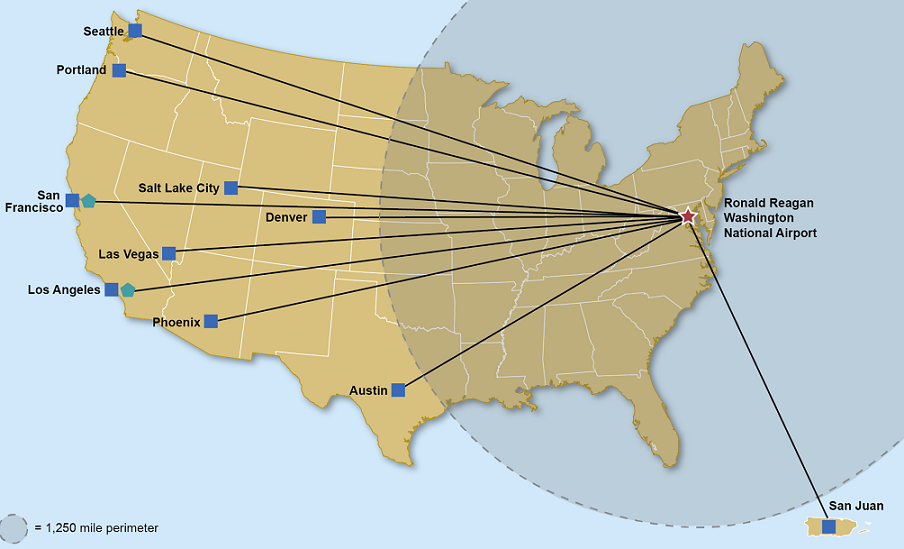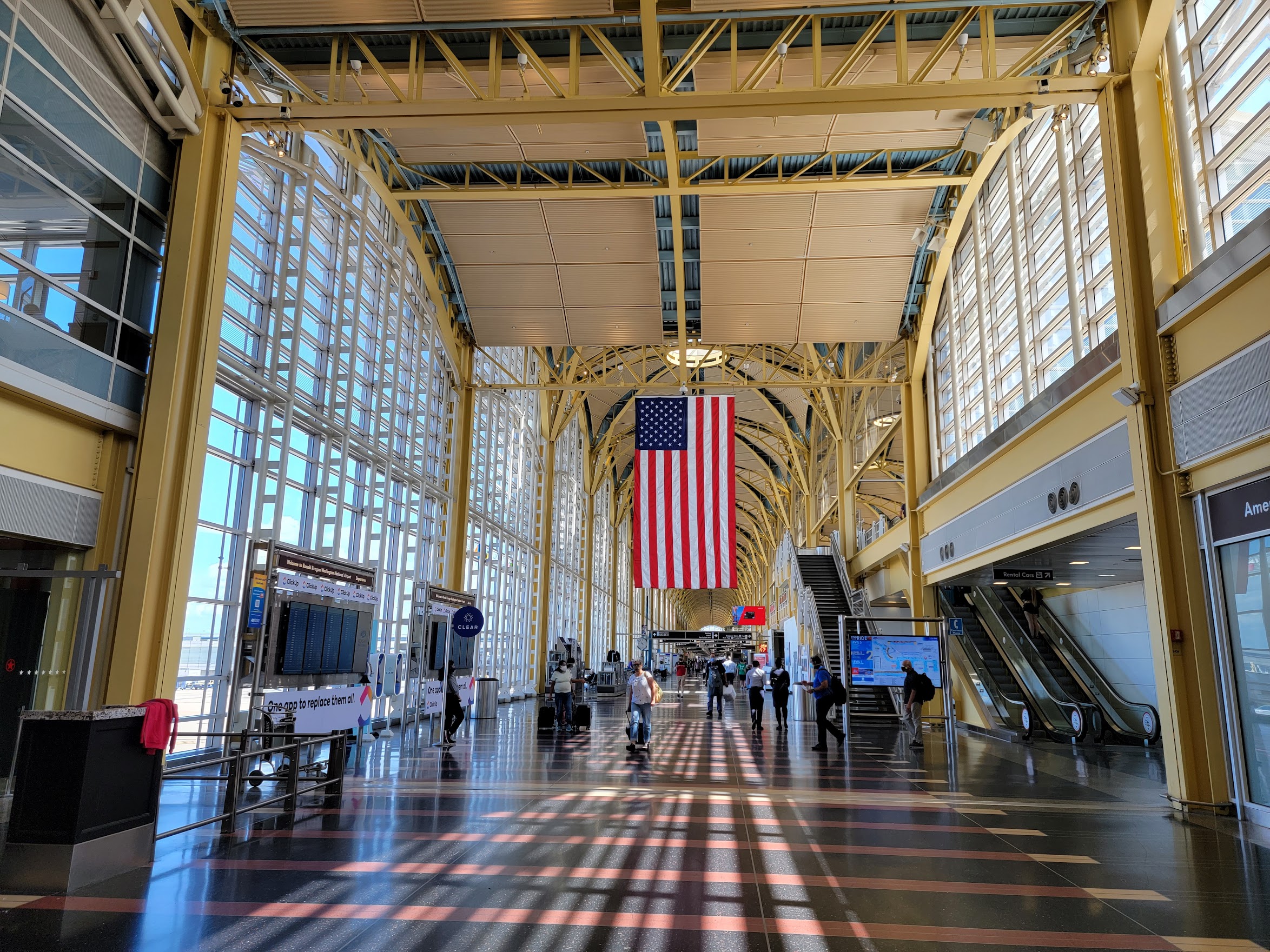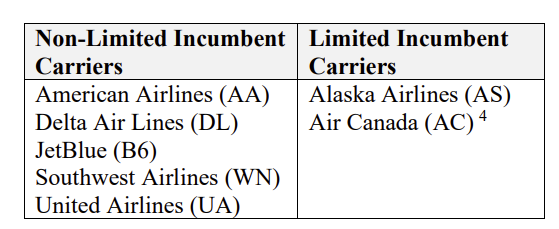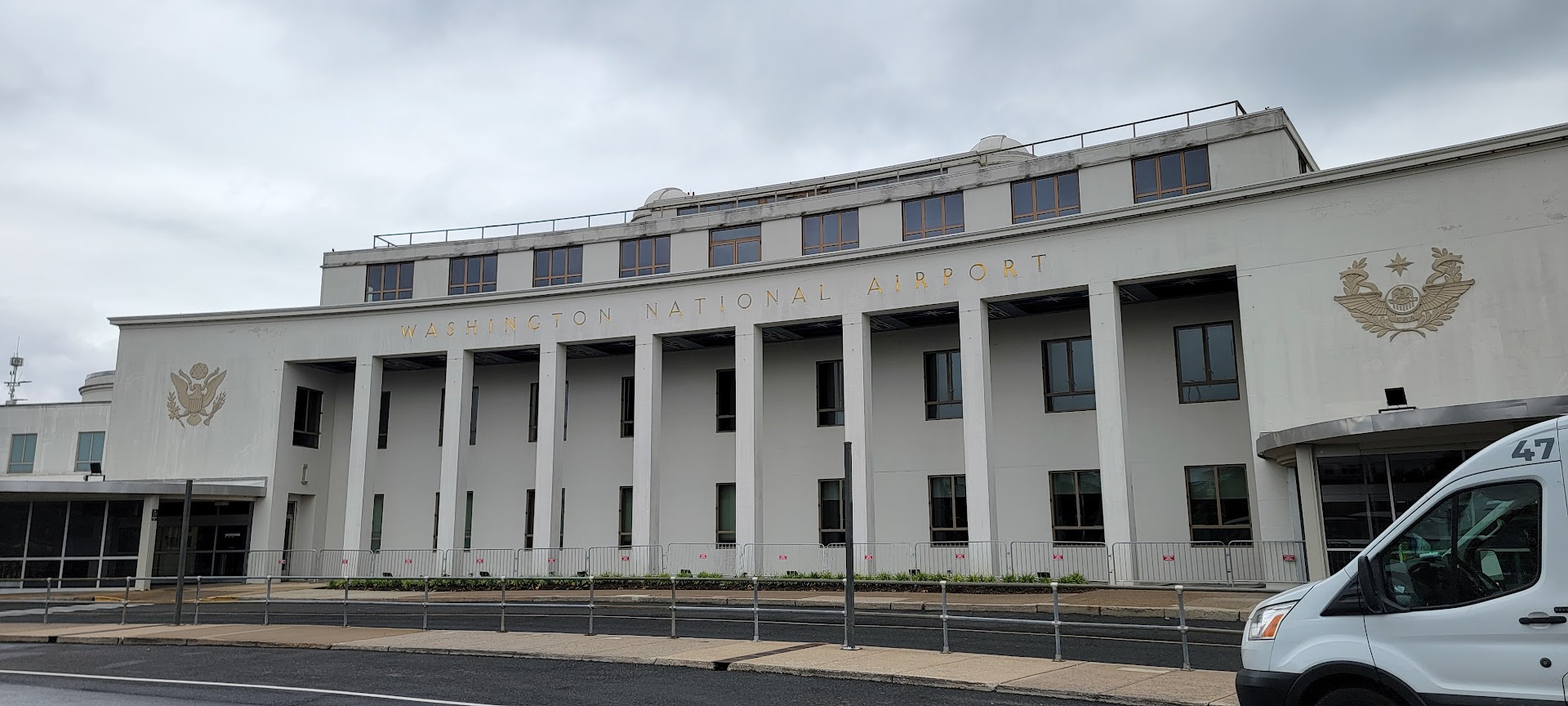Washington’s Reagan National airport has a ‘perimeter rule’. No flights are permitted beyond 1,250 miles, except for a limited number that have been proscribed by law and handed out by the Department of Transportation.

The recent FAA Reauthorization Bill contains 5 new roundtrips that DOT can assign ‘beyond the perimeter’ and airlines are jockeying for those.
Congress said that these mostly go to the big airlines already at the airport. Remember, these slots were lobbied for. Specifically, 5 new trips are supposed to be allocated as followed:
- Non-limited Incumbent airlines: 4
- Limited incumbents: 1
- New entrants: 0
American, Delta, United, Southwest and JetBlue are incumbent airlines. Assuming they all apply, four of the five will receive slots.

Frontier Airlines cannot have one. Even though they already fly to National airport, they only fly to Denver. Their 3 flights are exception markets, where they have beyond-perimeter slots. Those beyond-perimeter slots don’t count and so Frontier counts as a new entrant to the airport. Weird, right?
The FAA did something strange when it laid out its process to assign these flights and outlined who was qualified in each category:

This is a strange list. First, it includes Air Canada but the text of the bill creating the slots makes Air Canada ineligible.
- Under DOT order 2012-2-21, Air Canada is considered a limited incumbent carrier at the airport. Under 49 USC 41718 Canadian carriers can be considered for slot exemptions at the airport, consistent with the U.S. – Canada Open Skies agreement.
- However, the FAA Reauthorization bill approving these new slots specifies that they are for travel between Washington National and “domestic airports located within or beyond the perimeter.” Air Canada cannot fly U.S. domestic routes and is thus ineligible to apply. (I’d be curious to know from subject matter experts whether specific language limiting slots to domestic flights, excluding Air Canada from consideration, would violate the U.S. – Canada Open Skies treaty, which I did not go back and review.)
Second, because it then suggests Alaska Airlines is the only eligible limited incumbent. Alaska wants San Diego. It doesn’t include Spirit Airlines. Spirit is asking to fly to San Jose.
Spirit has filed an objection with DOT, and for reasons I laid out a month ago they should be eligible.
- A new entrant means “a commuter operator or air carrier which does not hold a slot at a particular airport and has never sold or given up a slot at that airport after December 16, 1985.” Spirit Airlines flew out of National airport 2003 – 2012 and is therefore not a new entrant.
- They sold their slots to Southwest, but that doesn’t disqualify them as a limited incumbent since 14 CFR § 93.213 says that, in determining whether an airline is a limited incumbent:
[T]he carrier is considered to hold the number of slots at that airport that the carrier has, since December 16, 1985:
(i) Returned to the FAA;
(ii) Had recalled by the FAA under § 93.227(a); or
(iii) Transferred to another party other than by trade for one or more slots at the same airport. - Since Spirit’s slots were “transferred to another party” (Southwest) and this was not transferred “by trade for one or more slots at the same airport” they are still considered to hold the slots that they sold.
Under the law, Spirit is pretty clearly still a limited incumbent carrier and eligible to seek the one available slot.
Here’s where things get even more interesting: Spirit makes the case that they are the only carrier eligible for that slot.
49 USC 41714(k) says that the Department has to look at the total number of slots that Alaska and American hold together in determining whether Alaska is a limited incumbent, since the two carriers have a codesharing agreement. Taken together, Alaska would have too many slots to qualify.
For purposes of this section and sections 41716, 41717, and 41718, an air carrier that operates under the same designator code, or has or enters into a code-share agreement, with any other air carrier shall not qualify for a new slot or slot exemption as a new entrant or limited incumbent air carrier at an airport if the total number of slots and slot exemptions held by the two carriers at the airport exceed 20 slots and slot exemptions.
In fact, American and Alaska don’t just codeshare – they codeshare on enough routes from National airport that considering just those routes Alaska would not be a limited incumbent carrier.

Since Alaska is not a new entrant, and by this rendering not a limited incumbent carrier, they should be able to compete for a slot as a non-limited incumbent alongside American, Delta, et al.
Interestingly, this rule must have been top of mind for the Department of Transportation as well because Republic Airways holds slots at the airport but wasn’t included as an eligible limited incumbent. They operate under the same code as other airlines who are non-limited incumbents.
I’m eagerly anticipating how the Department of Transportation responds to what appears to be a clear error on their part, and whether this is something that winds up in court. And can we just eliminate this stupid perimeter rule at National airport already?
(HT: Enilria)


Hopefully Spirit gets a slot. Nothing comes even close to the value of their BFS.
All this bureaucratic nonsense…and for no legitimate purpose except protecting government and incumbent power. This is what happens when government, and not free markets, is in control.
Auction all slots off on an annual basis, or even more frequently. Allow airlines to sell, rent, or trade slots. The public would be much better off.
@Mantis – no need for slots at all, just allocate takeoff and landing capacity using congestion pricing
Time to eliminate the range restriction at LGA as well @Gary.
Good call to prioritize the network carriers.
No need to waste time on ULCCs – and they’d probably pull any new route after a few months anyway, like they always do.
Sounds reasonable that Air Canada should be given one of the exemption slots, if there is a notable market DCA-YVR.
@Mantis : Asking for free markets to “fix” government control will only give the government more power… What we need is regulation, not more “freedums”.
Time to shut down this airport. A National Security risk and a monument to political pork.
Wow, Ghost, I assume spirits don’t take their reasoning into afterlife.
All of the talk about auctioning off slots ignores the fact that the US is a signatory to multiple global aviation agreements that recognize slots as being granted by a government on a permanent basis to airlines as long as usage requirements are met.
whether that is the right system or not is up for debate, but the US will never be able to change slot requirements if it wants its airlines to be able to access global airports